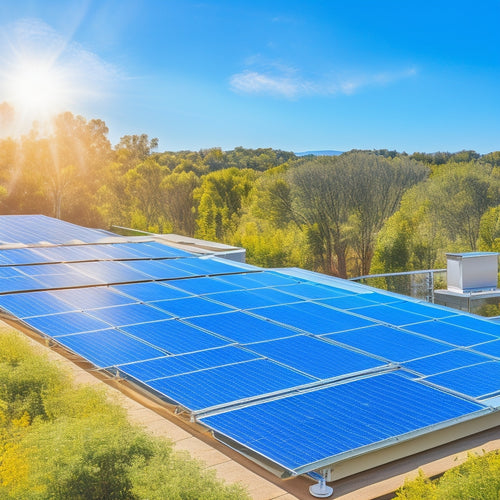
Rural Home Energy Independence With Battery Storage
Share
By incorporating battery storage into your rural home's energy system, you'll utilize the power of renewable energy sources like solar and wind power, reducing your reliance on the grid and fossil fuels. You'll store excess energy for use during low production periods, ensuring uninterrupted access to essential appliances and lighting during outages or extreme weather events. To achieve this independence, you'll need to choose the right battery type, size your storage needs accurately, and integrate your system with solar power. As you investigate the benefits and considerations of battery storage, you'll reveal the key to unblocking a sustainable, cost-effective, and energy-independent future.
Key Takeaways
- Combining solar power with battery storage maximizes energy independence for rural homes, reducing reliance on the grid and fossil fuels.
- Sizing battery storage correctly ensures 1-3 days of energy autonomy, even during periods of low energy production or extreme weather events.
- Lithium batteries offer longer lifespans and higher discharge rates, making them a suitable choice for rural homes seeking energy independence.
- Battery maintenance and monitoring are crucial to optimize system performance, detecting potential issues early and ensuring maximum energy output.
- Significant cost savings, tax rebates, and government incentives make rural home energy independence with battery storage a viable and attractive option.
Benefits of Home Battery Systems
By integrating a home battery system into your rural residence, you'll be utilizing the full potential of renewable energy sources like solar and wind power.
This setup allows you to store excess energy generated during the day for use during periods of low energy production, reducing your reliance on the grid and mitigating the environmental impact of fossil fuels.
With a home battery system, you'll experience improved energy resilience, as you'll have a backup power source during outages or extreme weather events renewable security.
Proper system sizing is essential to guarantee seamless backup power during prolonged outages, maintaining critical systems.
This means you'll enjoy uninterrupted access to essential appliances and lighting, even when the grid is down.
Choosing the Right Battery Type
Several key factors come into play when selecting the ideal battery type for your rural home energy independence system.
You'll want to contemplate lithium advantages, such as longer battery longevity and higher discharge rates, which make them a popular choice. However, lead acid batteries have drawbacks, including shorter lifespans and lower efficiency.
When evaluating options, it's crucial to reflect on maintenance-free designs, which eliminate regular upkeep needs, and performance metrics like capacity, efficiency, and discharge rate.
Cost comparisons are vital, as lithium batteries are generally more expensive upfront, but may provide longer-term savings.
Installation considerations, such as space and weight constraints, must also be taken into account. Additionally, think about environmental impacts, safety features, and voltage compatibility.
When choosing a battery type, consider the number of charge cycles it can handle and its overall efficiency.
Sizing Your Battery Storage Needs
You'll need to assess your energy demands to determine how much power you'll require from your battery storage system during periods of low solar or wind input.
To do this, you'll need to calculate your daily energy usage in watt-hours (Wh), taking into consideration factors like appliance efficiency, lighting needs, and heating and cooling requirements.
When selecting a battery type, consider factors such as deep cycle battery options and prioritize essential appliances for storage solutions.
Assessing Energy Demands
Evaluating Energy Demands
Most rural homes require a minimum of 10 kWh of daily energy to power essential appliances, lighting, and heating.
To determine your energy consumption, you'll need to calculate your daily energy usage. Start by identifying your peak usage periods, typically morning and evening when lights, appliances, and heating systems are in use.
Record the wattage of each device and the number of hours it's used daily. Multiply the wattage by the usage hours to get the total daily energy consumption in watt-hours (Wh).
Then, divide the total Wh by 1000 to convert it to kilowatt-hours (kWh). This will give you an accurate evaluation of your energy demands, helping you size your battery storage needs effectively.
Calculating Storage Capacity
Now that you've evaluated your energy demands, it's time to determine the storage capacity required to meet those needs.
To calculate storage capacity, you'll need to take into account your energy resilience goals, including the storage duration you require during power outages or periods of low renewable energy generation.
A common approach is to size your battery storage system to provide 1-3 days of energy autonomy, depending on your specific needs and energy usage patterns.
By analyzing your energy demands and desired storage duration, you can calculate the total kilowatt-hours (kWh) of storage capacity required.
This will help you select the right battery storage solution for your rural home energy independence goals.
Integration With Solar Power Systems
As rural homeowners increasingly turn to renewable energy sources to power their homes, integrating solar power systems with existing energy infrastructure becomes an essential consideration.
When you combine solar power with battery storage, you reveal the full potential of solar battery collaboration. This integration enables you to generate electricity during the day and store excess energy for later use, reducing your reliance on the grid.
By doing so, you can achieve grid independence, relying less on external energy sources and more on your own renewable energy system.
With a well-designed system, you can optimize energy production, reduce energy waste, and enjoy a more sustainable and independent energy future.
Battery Maintenance and Monitoring
You'll need to perform regular battery health checks to guarantee your energy storage system is functioning within ideal parameters.
This involves monitoring key indicators such as state of charge, voltage, and temperature to identify potential issues before they affect performance.
Battery Health Checks
Performing regular battery health checks is essential to guaranteeing your rural home energy independence system operates at peak efficiency.
You'll want to monitor your battery's state of charge, voltage, and temperature to identify any potential issues before they become major problems. This proactive approach helps prevent energy degradation, which can reduce your battery's lifespan.
During a health check, you'll inspect the battery's connections, looking for signs of wear or corrosion. You'll also review the battery's charging and discharging patterns to confirm they're within the recommended specifications.
Remote Performance Tracking
Every hour, your rural home energy independence system generates a wealth of important data, and remote performance tracking enables you to tap into this information.
This data provides significant observations into your system's performance, allowing you to identify areas for improvement and optimize your energy usage.
With remote monitoring, you can access real-time energy analytics, tracking your energy production, consumption, and storage. This enables you to make data-driven decisions, ensuring your system operates at peak efficiency.
Remote performance tracking also allows for proactive maintenance, detecting potential issues before they become major problems.
Cost Savings and Incentives
Numerous rural homeowners are turning to renewable energy systems to power their homes, driven in large part by the significant cost savings and incentives these systems offer.
You can benefit from tax rebates, financing options, and government incentives that reduce the upfront cost of installing a renewable energy system.
By going off-grid, you'll enjoy energy efficiency and grid independence, reducing your reliance on utility companies.
Local programs, utility partnerships, and community initiatives can further lower your costs.
A thorough cost analysis will help you understand the long-term savings and environmental impact of renewable energy.
With the right system, you can break free from rising energy costs and minimize your environmental footprint.
Frequently Asked Questions
Can I Use My Battery Storage System for Backup Power During Grid Outages?
You can use your battery storage system for backup power during grid outages, but you'll need to evaluate your battery capacity and desired backup duration to guarantee you have enough power to meet your needs.
Are Home Battery Systems Compatible With All Electrical Panel Types?
You'll find that battery compatibility varies with electrical panel types, as some systems require specific panel configurations; for instance, some batteries need 3-phase panels, while others work with single-phase, so it's essential to check compatibility before installation.
Do I Need to Replace My Entire Electrical Panel for Battery Installation?
You're wondering if you'll need to rip out your entire electrical panel to make way for a shiny new battery installation. The answer is, it depends - meeting specific battery installation requirements might necessitate an electrical panel upgrade, but not always.
Can I Charge My Battery Storage System With a Generator?
You can charge your battery storage system with a generator, but verify generator compatibility by checking the system's charging options, such as AC-coupled or DC-coupled configurations, to confirm seamless integration and efficient energy transfer.
Will a Home Battery System Affect My Property's Resale Value?
According to the National Association of Realtors, 77% of homebuyers consider energy efficiency important. You'll be pleased to know that installing a home battery system can increase your property's value, as it's a desirable feature that enhances energy efficiency and overall home value.
Related Posts
-

Solid State Batteries in Electric Vehicles
Solid-state batteries revolutionize electric vehicles by offering a longer lifespan and higher energy density than tr...
-

What Types of Solar Energy Devices Are Available
You'll find several types of solar energy devices available today, each customized to different energy needs. Photovo...
-

Solar Powered Lights for Sustainable Home Decor
Solar-powered lights offer a stylish and eco-friendly way to enhance your home decor. They capture sunlight, converti...


